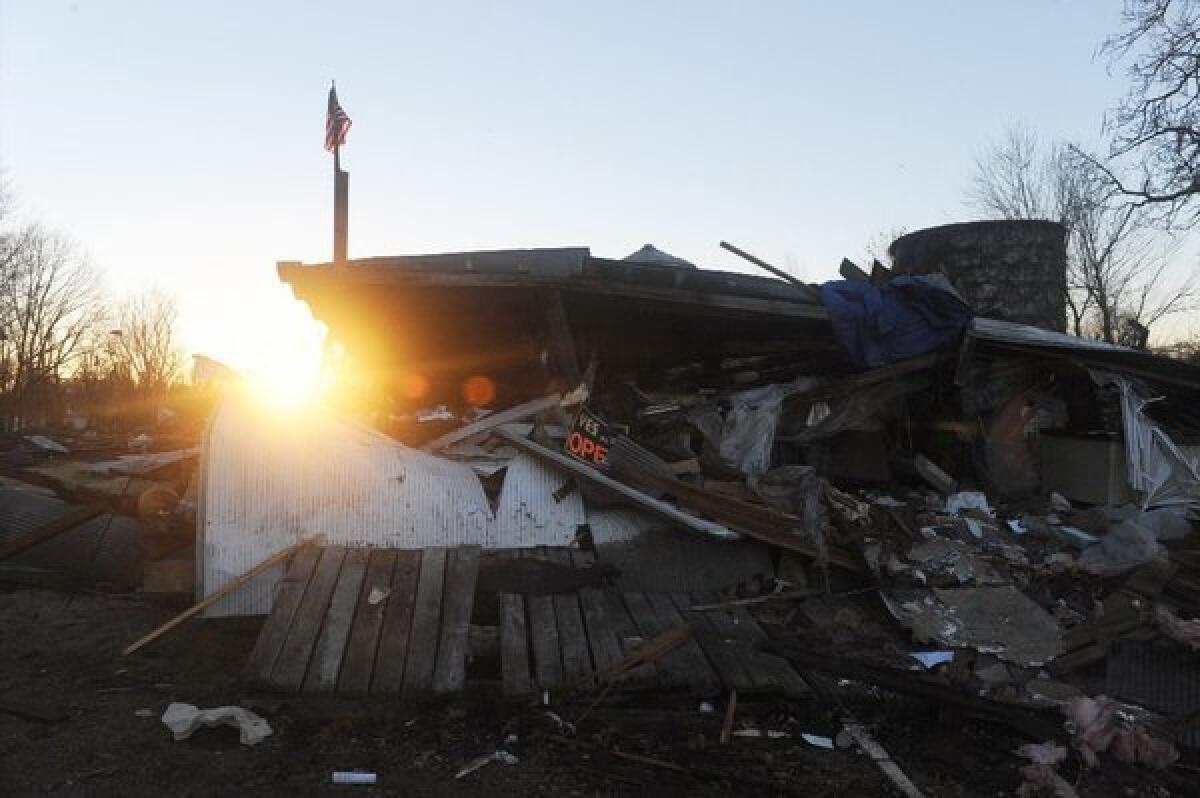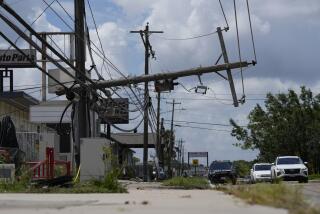‘Off the charts’ November storms led to record-breaking tornadoes

The November tornadoes that raked the Midwest were unusual, possibly even record-breaking, but they had been forecast three days in advance. For some residents, though, the warning wouldn’t be enough.
On Monday, emergency officials and damage experts were picking through the wreckage of what Illinois Gov. Pat Quinn called “the deadliest series of tornadoes Illinois has ever had in the month of November,” with six people killed in Illinois and dozens more injured in communities across the Midwest. Violent weather also killed two Michigan residents.
Officials said the twister that ripped through Washington, Ill., inflicting some of Sunday’s worst damage, may have been the strongest November tornado in Illinois’ history.
Weather officials were trying to determine exactly how many tornadoes there were, as well as their strength.
Twisters and possible twisters were also reported in Missouri, Kentucky, Indiana, Michigan, Ohio and Tennessee.
As it turns out, the tornadoes were born of storms whose dangerous potential had been forecast days earlier.
In late October and early November, Illinois typically has what National Weather Service meteorologist Dan Smith described to the Los Angeles Times as a “second peak” of turbulent weather when it’s “not out of the question” to get tornadoes.
But, Smith added, the storm system that led to Sunday’s tornadoes had a magnitude that was “pretty rare” for November.
Last week, forecasters watched as a low-pressure system forced moisture northward over the Midwest, ultimately colliding with a tide of strong winds and a cold front pushing eastward.
Moisture plus strong winds and 70-degree temperatures equaled trouble, like a runaway truck careening toward a busy intersection. The National Weather Service’s Chicago branch called the ensuing instability “off the charts” for November.
“With the parameters [for thunderstorms and tornado-creating supercells] all extremely high for any time of the year, long-lived significant tornadoes became likely,” the weather service said in a Monday dissection of the storms.
On Thursday, three days before the storms, the National Weather Service issued an alert that tornadoes were possible in an area stretching from Arkansas to Ohio on Sunday. The predicted area of impact turned out to be quite accurate.
Next time you’re about to make a joke about the Meteorologist always being wrong, remember this map: pic.twitter.com/GaQfEYYC2L— Eric Fisher (@ericfisher) November 18, 2013
“Everybody had fair warning. This thing developed over an hour and a half, a two-hour period,” Larry Douglas, a volunteer and former manager of the Massac County Emergency Services and Disaster Agency, told the Los Angeles Times. “It’s a shame anybody was in the path of it.”
In Massac County, along Illinois’ southern tip, 50 residences, some of them mobile homes, were destroyed when a tornado lashed the riverside community of Brookport. The winds may have reached EF-3 in strength, from 136 mph to 165 mph, officials said.
Three people were killed and at least 11 others injured in Massac County. Few if any of the residents had basements because their homes were near the Ohio River, Douglas said.
In Washington, Ill., where at least one person was killed and 37 others injured, officials suspect the tornado that blasted the town may have been an EF-4, packing winds from 166 mph to 200 mph.
There have been more than three dozen moderate-strength November tornadoes in Illinois since record keeping began in 1885, but there had never been such a strong tornado “until this year,” the weather service said.
As of an October tally by the National Climatic Data Center, 2013 had been a “much below average” year for tornado activity in the U.S.
[For the record, 8:45 p.m. Nov. 18: An earlier version of this post failed to make clear that the weather service records on three dozen moderate-strength tornadoes pertained only to November.]
ALSO:
2 miners killed, 20 injured in Colorado mining accident
Methodist pastor married gay son ‘in good conscience’
Midwest tornadoes: ‘Devastation, sadness,’ Illinois mayor says
More to Read
Sign up for Essential California
The most important California stories and recommendations in your inbox every morning.
You may occasionally receive promotional content from the Los Angeles Times.









